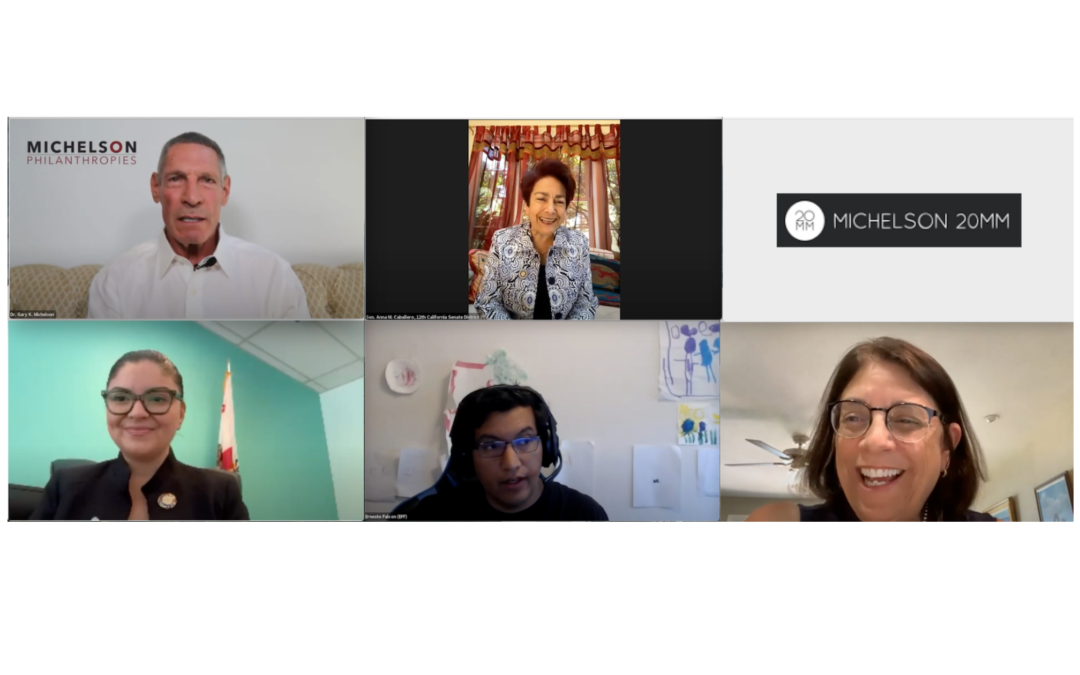On June 25th, the Michelson 20MM Foundation along with the California Community Foundation and the Silicon Valley Community Foundation hosted “Digital Equity in the California Legislature: The Golden State’s Historic Opportunity.” The discussion centered on California’s current digital equity public policy landscape and highlighted the unique opportunity the state has to finally bridge the digital divide for its residents.
The event’s keynote speakers included Assemblywoman Cecilia Aguiar-Curry (D-4), Senator Anna Caballero (D-12), and Senator Lena Gonzalez (D-33)—all visionary legislators who have put forth digital equity policies before the state legislature. Speaking to the importance of the moment, 20MM Founder and Co-chair Gary K. Michelson, M.D., said, “Intelligent and compassionate policy is our greatest lever for social change. Once in a while—sometimes just once in a generation—we have a singular opportunity to address long-standing systemic inequities that can make the world a bit more fair, not just for our children, but their children and beyond. I believe we are faced with such an opportunity today.”
Presenting Bold Solutions
- Governor Newsom’s Proposal:
This spring, Governor Gavin Newsom proposed dedicating $7 billion toward addressing California’s digital inequity. His plans call for the build-out of a statewide, open access, middle mile network and provisions that allow for publicly owned, last mile, municipal broadband networks.
- Assembly Bill 14:
Through Assembly Bill 14, “The Internet for All Act of 2021,” Assemblywoman Aguiar-Curry seeks to prioritize the deployment of broadband infrastructure in California’s unserved rural and urban communities by extending the ongoing collection of funds deposited into the California Advanced Services Fund (CASF). These fees would allow California to access federal agriculture, healthcare and education grants, providing communities with the dollars necessary to narrow the digital divide. According to Assemblywoman Aguiar-Curry, “AB 14 opens the door for local governments, electrical cooperatives, and tribal governments to provide connectivity in their own communities where the private sector cannot, or they choose, quite frankly, not to go or provide sufficient service.”
- Senate Bill 4:
With Senate Bill 4, “The Broadband for All Act”, Senator Lena Gonzalez proposes extending the sunset on the CASF and updating it by promoting the deployment of high-speed broadband. The bill would also make it easier for local governments to apply for grants and finance their own infrastructure. “SB 4 will begin to provide the investment needed to build fiber connectivity to every home, school, and business in California…It’ll enable infrastructure projects to be built in unserved and underserved communities…and will help local governments and internet service providers of all sizes to apply for grants and invest in 21st-century internet infrastructure that can meet Californians’ everyday needs,” said Senator Gonzalez.
Together, AB 14 and SB 4 would replenish and recast the CASF—California’s primary vehicle for state-funded broadband infrastructure projects.
- Senate Bill 28:
Through Senate Bill 28, “The Rural Broadband and Digital Infrastructure Video Competition Reform Act of 2021,” Senator Caballero is looking to help rural, unserved, and underserved communities build broadband networks that reach all Californians, with an emphasis on oversight and regulation of cable video franchises. “SB 28 puts state assets to work…makes them available for broadband infrastructure with minimum download speeds of 100 Mbps…makes it easier to do municipal broadband development…and seeks granular data on where [internet] services are being provided to make sure that redlining and discrimination are not occurring,” said Senator Caballero.
Equity at the Forefront
Ernesto Falcon, senior legislative counsel at the Electronic Frontier Foundation, tied our conversation together, saying, “California can be a global leader, we can be the part of the world that people look toward on cheap fast access to all people, but for decades we’ve spent an awful lot of money subsidizing the same small number of large national private players—your AT&Ts, your Comcasts, your Charters—and an over-reliance on them has been a core part of our mistake.” These are the same entities that stand to benefit from maintaining California’s broadband status quo.
In his closing remarks, Falcon urged, “It’s time to start treating this infrastructure as an essential service…It’s time to start putting equity at the front of the stage of an essential service, this is no longer a private luxury…Profiting from discriminatory deployment of this service is unacceptable.”
View the full recording of Digital Equity in the California Legislature: The Golden State’s Historic Opportunity. Read the full transcript.
If you’d like to engage in the digital equity policy conversation taking place in California, AB 14 will be heard in the Senate Energy, Utilities and Communications committee on July 5, 2021, SB 4 will be heard in the Assembly Communications and Conveyance Committee on July 7, 2021, and SB 28 was heard in the Assembly Privacy and Consumer Protection Committee on July 1, 2021.
